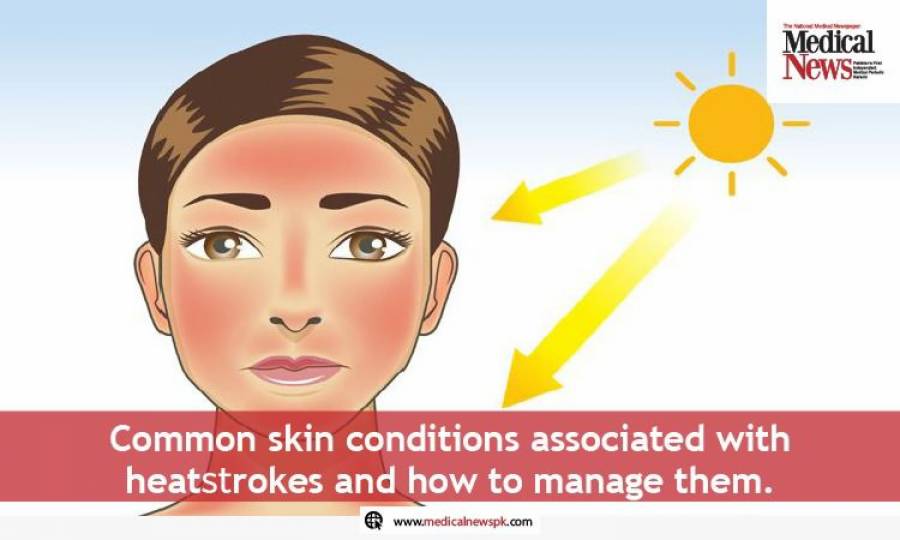Common Skin Conditions Associated With Heat Stroke and How to Manage Them

Heat stroke and ultraviolet (UV) rays may harm skin cells if you expose yourself to the sun for an extended period. Over time, UV damage may lead to skin that seems older than it is. Also, it may cause precancerous and cancerous lesions as well as wrinkles, dark spots, freckles, and other skin concerns.
Even a single severe sunburn may have a long-term impact on your health. Your skin may blister and become red while you're still in the sun, or it may take many hours before you notice any symptoms.
Skin conditions associated with heat stroke in Pakistan
Summers in Pakistan are unbearably hot. While the heat and humidity of summer disrupt your daily routine, it also negatively impacts your health and, in particular, your skin, which is the organ most exposed to the elements throughout the season.
Heat rashes, fungal illness, and photosensitive dermatitis are among the most common skin ailments in the summer months. Melasma and prickly heat are also on the rise. Every day, at least 40 out of every 100 patients who come to the OPD report having a skin problem. Let's look at the most frequent summer skin issues and how to prevent them in this article.
Rosacea
Rosacea is currently believed to be caused by a person's predisposition to flush or blush due to sun damage. According to a National Rosacea Society study, more than half of rosacea patients said that their symptoms were at their worst in the summer. Increased physical activity and exposure to the sun's rays might be the main issues.
Wear light, loose clothes. Breathable fabrics help curb the feeling of suffocation. Drink enough water in the summer to keep yourself hydrated.
Eczema
Sweating may irritate the skin and produce histamine, leading to flare-ups in Eczema. Hydration of the skin is necessary for these conditions. Usage of sunscreen will also help to avoid such reactions.
Vitiligo
Avoid exposing yourself to the sun's harmful rays. Because the skin cells in the white spots present on the epidermis have died, they are more vulnerable. As your skin heals, it's possible that other portions of your body may become more sensitive to the sun. The starkness of your skin's hues might be exacerbated by prolonged exposure to the sun.
Skin fungus
Skin fungus (tinea versicolor) may become more noticeable when exposed to the sun. Unlike pityriasis Versicolor, which may be unpleasant and infectious, tinea versicolor is not. Tinea versicolor may be treated with antifungal creams, lotions, or shampoos.
Fungi-like damp, warm environments and body parts that sweat heavily during the summer months are ideal breeding grounds. Summer activities, such as public showers at pools and beaches, might encourage fungus development.
Acne
When the temperature rises over 100 degrees Fahrenheit, your skin becomes more sensitive and prone to irritation. As a result of the intense heat, sweating is a common occurrence. As a consequence of our country's heavy dust and grime, sweat ducts might get clogged, resulting in perspiration being trapped, irritating pimples, and acne on the skin.
To prevent contracting this disease
- Make sure you have a clean environment around you
- Take a soothing shower after a stressful working day
- Use an antibacterial soap or bath gel
- Make every effort to stay dry
Heat rash
Summer's hot, humid, and sunny weather certainly takes a toll on your skin. A rash is one of the side effects of overexposure to the sun. Inflammation may result from overheating. Wear sunscreen and make sure the affected area remains clean in order to avoid exacerbation of the heat rash.
How to take care of your skin in hot weather
Drink sufficient water to keep yourself hydrated (at least 2 litres)
Tap or pat the affected area of the skin. Try not to scratch it
Take a cool bath or shower
Wear light, moisture-wicking clothes
Consult the doctor if the condition worsens
Trending
Popular
Sindh pledges vigorous action to prevent poliovirus transmission
-
PMA stresses health equity on World ...
04:08 PM, 9 Apr, 2024 -
Dow University’s new rabies vaccine ...
12:18 PM, 28 Mar, 2024 -
IRD role lauded in advancing ...
02:53 PM, 12 Mar, 2024 -
Over one billion people worldwide ...
09:48 AM, 5 Mar, 2024




